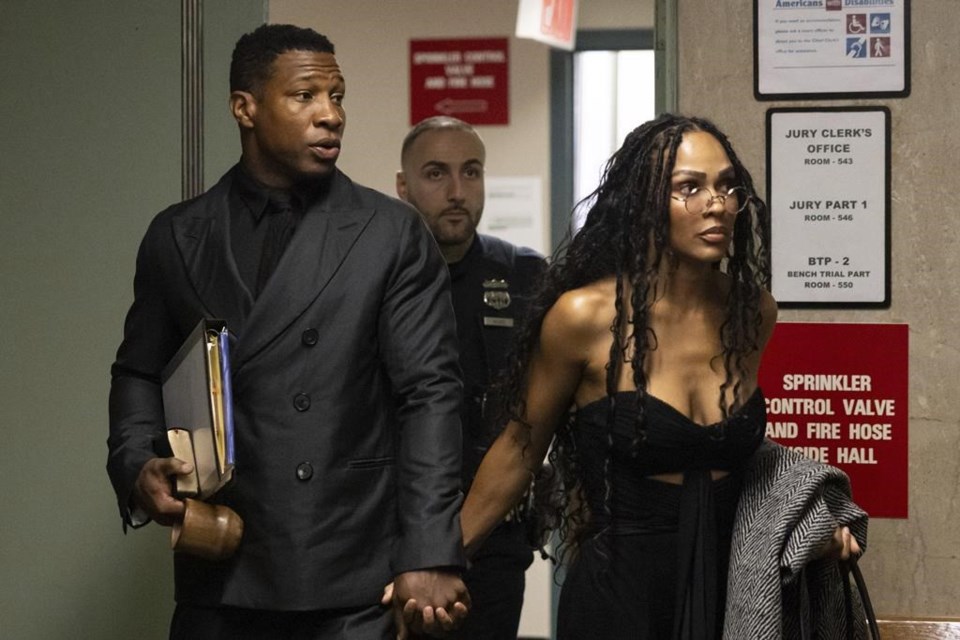NEW YORK (AP) — Jonathan Majors listened silently, head-cocked and eyes down, as a Manhattan prosecutor and his defense attorney offered competing accounts of a violent confrontation in the backseat of a car that led to assault charges against the film star and put his rapid Hollywood ascent on pause.
The opening statements Monday in the trial against Majors centered on whether the actor assaulted his former girlfriend, Grace Jabbari, after she read a romantic text message sent to his phone by another woman.
Prosecutors say Majors grabbed the woman’s hand so hard he fractured her middle finger, then twisted her arm behind her back and struck her on the side of the head – the latest outburst in an alleged pattern of physical and emotional abuse. An attorney for Majors argued that her client was the true victim, claiming he was left bloodied by the attack, while she spent the rest of the night clubbing.
That the competing versions of the struggle were presented to a jury was itself unusual, a rare instance of a misdemeanor assault case going to trial. For Majors, a 34-year-old rising star, the stakes may be higher than the one year in prison he could face if convicted.
In her opening statements, the actor's attorney, Priya Chaudhry, described the allegations as a revenge plot to “ruin Jonathan Majors and take away everything he has spent his whole life working for.”
Pointing to Majors' breakout roles in “Creed III” and his emergence as a key supervillain in the Marvel multiverse, Chaudhry said her client's career “seemed unstoppable until he ended his relationship with Ms. Jabbari and she, hours later, made these false allegations.”
Since his arrest in March, an ad campaign for the U.S. Army featuring Majors has been pulled and the release of “Magazine Dreams," a Sundance award-winning filming that he starred in, has been postponed.
Chaudhry also invoked Majors’ race – he is Black, Jabbari is white – as a potential reason that he was arrested the day after the confrontation.
In his own opening statements, assistant district attorney Michael Perez described the alleged assault as the culmination of a “cruel and manipulative pattern of psychological and physical abuse” that Majors directed at his partner of two years.
The trial, he said, would show that Majors “demanded total compliance” from his girlfriend, at one point telling her that she needed to model herself after Michelle Obama or Coretta Scott King. If she didn't meet that standard – by staying out late with friends or going to a music festival, for example – Majors would often become angry, throwing household objects or shouting at her, the prosecutor said.
Both prosecution and defense offered clashing narratives about the aftermath of the alleged assault as well.
Once the driver pulled over, Majors fled the scene with his phone as Jabbari chased him "on foot, through traffic, like in a movie,” according to Chaudhry. Unable to find Majors, she met three strangers and followed them to a Manhattan night club, where she spent the next few hours drinking and dancing, the defense attorney said.
The prosecutor, meanwhile, said Majors picked Jabbari up and threw her inside the car on multiple occasions after the driver pulled over. He said she accepted the invitation of bystanders in hopes of “temporarily blocking out” the abuse committed by Majors. She returned home after a few hours at the nightclub, took two sleeping pills and fell asleep on the floor of her bathroom, he said.
Jabbari awoke the next morning to Majors standing over her with police officers. Though Perez said she was initially reluctant to report the abuse “because of how he’s manipulated her in the past and trained her to stay silent,” she soon told police about the alleged assault, leading to the arrest of Majors.
She was hospitalized with minor injuries. Six months later, she was arrested by police after Majors brought a counter-claim against her for assaulting him in the vehicle. Those charges were dismissed by the Manhattan DA the following day.
Perez referenced the arrest on Monday, telling jurors that Majors' “attempts to control and intimidate Ms. Jabbari extended well after he assaulted her.”
Jabbari is expected to testify against her former partner in the coming days. Majors did not speak to reporters as he entered and exited the courtroom on Monday.
Jake Offenhartz, The Associated Press



